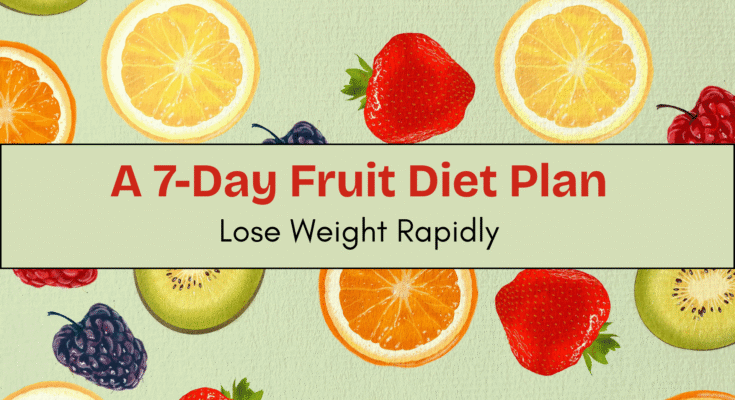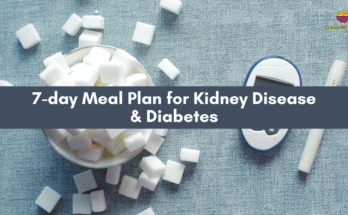So, you’ve decided you want to drop a dress size before an event? You need speed, minimal effort, and you’ve probably stumbled upon one of the internet’s favorite quick-fix fairy tales: the 7-Day Fruit Diet.
There’s nothing better than the siren song of rapid weight loss! It promises a slimmer you by next Friday, all while enjoying the simple, sweet bounty of nature. What could go wrong? Spoiler alert: a lot, but let’s be optimistic for now, shall we?
To start, let’s clarify one thing: rapid weight loss is usually water loss, which is as sustainable as a submarine screen door. But hey, for a week? Think of it as an all-natural cleanse, where you temporarily give up complex carbs and tasty fats for high-fibre digestion and sugar cravings that won’t go away.
Get ready for a wild seven-day fruitarian experiment, strict, questionable, and slightly absurd. We’ll cover what to eat, what to avoid, and toss in real expert advice to keep you alive.
Grab your grapes and hang on if you start craving cheeseburgers, it’s protein shake o’clock.
What Exactly Is a Fruit Diet?
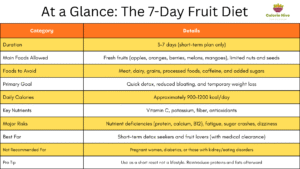
Picture this: your plate is a rainbow of apples, oranges, berries, and maybe an exotic mango or two. No meats, no grains, no dairy. Just fruits, and sometimes a handful of nuts or seeds if you’re feeling rebellious.
The fruit diet, often called fruitarianism in its stricter forms, is basically a vegan offshoot where raw fruits make up the bulk of your calories. Some people go all-in, eating only what falls from the tree (talk about low-effort foraging), while others mix in veggies or a bit of protein to avoid turning into a human prune.
The appeal? Fruits are low in calories but high in water and fiber, which means you can eat a ton without packing on the pounds. According to experts, fruits provide essential vitamins, such as Vitamin C and potassium, which help keep your body functioning properly.
But here’s the twist: if humans were meant to live on fruit alone, we’d all be monkeys swinging from trees. In reality, this diet is extremely restrictive, often limiting intake to 70-80% fruits, with the rest consisting of minimal add-ons, such as nuts or leafy greens.
Why do people do it? For quick weight loss, detox vibes, or even environmental reasons, fruits don’t require cooking, so you’re saving the planet one apple at a time. But rapid weight loss?
That’s mostly water weight and glycogen stores vanishing, not actual fat. You might drop 5-10 pounds in a week, but, much of it bounces back once you return to your normal eating habits.
Think of it as a short-term reset, rather than a lifestyle change. If you’re over 40 or have health issues, consult with a doctor first. Nobody wants a fruit-induced faint.
Fruits you should Eat and their Benefits
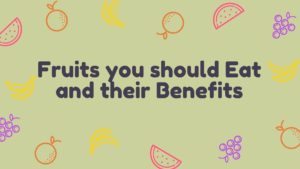
Okay, let’s get to the good stuff. Fruits aren’t just tasty; they’re packed with goodness that can legit help with weight loss. Firstly, they’re extremely low-calorie.
A big bowl of strawberries has fewer calories than a single cookie, and the fiber keeps you full so you’re not raiding the fridge at midnight. That fiber also revs up your digestion, helping with bloating and constipation.
Then there’s the hydration factor. Fruits like watermelon are essentially water in edible form, helping to flush out toxins and prevent you from mistaking thirst for hunger. Antioxidants in berries and citrus help combat free radicals, potentially enhancing skin health and reducing inflammation.
Oh, and vitamin C? It’s your immune system’s best friend, plus it boosts collagen for that youthful glow. As one source notes, fruits can help lower cholesterol and promote regular bowel movements. Okay, let’s get to the good stuff.
For rapid weight loss, the low energy density is key. You eat more volume for fewer calories, tricking your brain into thinking you’re feasting. Some studies suggest increasing fruit intake can aid weight management by reducing overall calorie consumption. And let’s not forget the energy boost from natural sugars, better than a caffeine crash, though you might miss your morning coffee.
The Sour Side: Risks and Side Effects
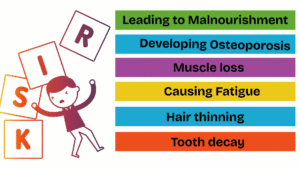
Now, for the reality check. A fruit-only diet sounds paradise-like, but it’s more like a tropical storm for your body. Experts warn it’s highly restrictive, leading to malnourishment if done wrong. You’re missing out on protein, fats, calcium, B vitamins, and omega-3s, and that’s essential for not feeling like a zombie.
Protein deficiency? Yes, that can lead to muscle loss, fatigue, and even hair thinning. Who wants to lose weight but gain a bad hair day? And all that fructose? It spikes blood sugar, making it a no-go for people with diabetes or anyone with insulin issues.
In the long term, you risk developing osteoporosis due to low calcium intake, anemia resulting from iron deficiency, and a weakened immune system.
Oh, and tooth decay from all the acids? Because nothing says “healthy” like a dentist bill. You might feel dizzy, weak, or downright hangry due to low calorie intake; around 900-1000 calories a day isn’t sustainable for most. Experts say it’s fine for up to 3 days, but stretching to 7? Proceed with caution, or you could end up in starvation mode, where your metabolism slows to a crawl.
Not for everyone: Skip if you’re pregnant, have kidney issues, or have a history of eating disorders. The weight loss is often temporary, mostly due to water and muscle loss, rather than fat. So, yeah, rapid? Sure. Sustainable? Good luck.
Preparing for Your Fruity Week
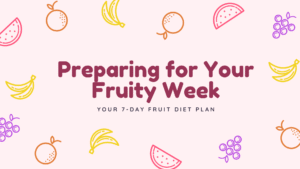
Before you stock up on produce, let’s prep like pros. First, consult a doctor seriously; don’t be the person who faints mid-grocery shop. Ease into it by cutting junk food a few days prior: ditch caffeine, processed foods, and meats gradually.
Shop smart: Opt for organic options if possible. Variety is key—mix water-rich (watermelon), fiber-packed (apples), and vitamin C-rich (oranges). Stock nuts/seeds for protein boosts, as pure fruit might leave you lacking.
Hydrate like your life depends on it—12 glasses of water daily, plus herbal teas. Track portions to avoid sugar overload; aim for three meals and two snacks, and opt for light exercise only; no marathons on fruit fuel.
Mentally? Brace for cravings. Have a post-diet plan to help you transition back without experiencing rebound weight gain. Irritable due to la ow-calorie diet
Your 7-Day Fruit Diet Plan
Here’s a mostly fruit-based plan inspired by various sources, with minimal add-ons like nuts for added variety. Eat every 2-3 hours and drink plenty of water. Calories? Around 1000-1200/day. Adjust portions based on hunger.
Day 1: Detox Day (Water-Rich Fruits)
Focus on hydration to kickstart loss.
- Breakfast: Bowl of watermelon and kiwi slices. (Hydrating and low-cal.)
- Mid-morning Snack: Handful of strawberries.
- Lunch: Orange and papaya salad.
- Afternoon Snack: Blueberries.
- Dinner: Pineapple chunks with cantaloupe.
Total: Feel lighter already? That’s the water weight waving goodbye.
Day 2: Fiber Focus
Amp up digestion with fibrous picks.
- Breakfast: Apple with a sprinkle of chia seeds (for that protein tease).
- Mid-morning Snack: Pear.
- Lunch: Banana smoothie (blend with water, no dairy).
- Afternoon Snack: Dates (nature’s candy, but don’t overdo it).
- Dinner: Guava and raspberries.
Sarcasm: By now, your gut’s throwing a party—hope you like fiber fireworks.
Day 3: Vitamin C Boost
Rev metabolism with citrus.
- Breakfast: Grapefruit half with lemon water.
- Mid-morning Snack: Kiwi.
- Lunch: A mix of pineapple, orange, and kiwi.
- Afternoon Snack: Pomegranate seeds.
- Dinner: Mango and papaya bowl.
Expert tip: Vitamin C aids fat burn.
Day 4: Add Some Crunch (Nuts Allowed)
Prevent deficiency with fats.
- Breakfast: Banana with almond butter.
- Mid-morning Snack: Mixed berries.
- Lunch: Chia seed pudding with fruits.
- Afternoon Snack: Handful of almonds.
- Dinner: Avocado fruit salad (avocado counts as fruit, right?).
Top fruits to accelerate your weight loss eat up!
Day 5: Digestion Helpers
Enzymes for gut health.
- Breakfast: Papaya with walnuts.
- Mid-morning Snack: Fig.
- Lunch: Pineapple smoothie.
- Afternoon Snack: Dates again (variety, folks).
- Dinner: Kiwi and orange segments.
Feeling energetic? Or just fruity?
Day 6: Green Twist
Sneak in greens for minerals.
- Breakfast: Apple-ginger smoothie with spinach.
- Mid-morning Snack: Mango.
- Lunch: Kale-fruit salad.
- Afternoon Snack: Almonds.
- Dinner: Avocado-pomegranate mix with arugula.
Day 7: Balance It Out
Add plant protein for muscle.
- Breakfast: Berry chia pudding.
- Mid-morning Snack: Apple.
- Lunch: Quinoa-avocado salad (minimal quinoa).
- Afternoon Snack: Sunflower seeds.
- Dinner: Banana-almond smoothie.
Congrats! You survived. Weigh in, but remember it’s temporary.
Each day, aim for variety to meet your nutrient needs. Recipes? Simple: chop, blend, enjoy—for example, a papaya salad—just dice with lime juice.
Men and Women’s Reactions: Positives and Negatives

Let’s talk about how nutrient deficiencies from a 7-day fruit diet might hit males and females differently. Because, you know, biology loves to play favorites. Fruits are great sources of vitamins like C and potassium, but skimping on other nutrients can lead to imbalances, and gender plays a role in who feels the effects more. I’ll break it down by key nutrients, pulling from expert sources (no fruit-picking guesses here).
Keep in mind that this is a general guideline; everyone’s body is unique, so consult a doctor if you’re considering a change. Mother Nature didn’t make us all equal when it comes to deficiencies. Thanks for the plot twist.
Iron deficiency is basically a woman’s issue on steroids (or lack thereof). Women need more iron daily, about 18 mg, vs. men’s 8 mg, thanks to menstruation, which drains blood (and iron) monthly.
On a fruit diet, where iron sources are scarce (most fruits have zilch, though some like dried apricots offer a tiny bit), women are way more likely to feel wiped out, dizzy, or anemic.
Men? They usually have higher iron stores and don’t lose blood regularly, so a week of fruit consumption might not affect them as severely, unless they’re athletes or have other health issues.
So if you’re a woman, that fruit-only vibe could amplify fatigue faster, while guys might coast a bit longer. Pro tip: Pair fruits with vitamin C-rich ones to boost absorption, but it’s still no match for meat or fortified foods.
Calcium: Osteoporosis Loves a Gender Bias
Calcium needs are similar for young adults (approximately 1,000 mg/day for both). Still, women over 50 require 1,200 mg to help prevent bone loss, especially after menopause when estrogen levels drop and the risk of osteoporosis increases significantly.
Fruits like oranges or figs have some calcium, but not enough to hit those targets on a strict diet. Women could see quicker bone weakening or cramps, putting them at higher fracture risk 80% of osteoporosis cases are in women.
Men? Their risk ramps up later (around 70+), and they often have denser bones to start, so a short fruit stint might not rattle them as much. Sarcasm: Guys, enjoy your built-in bone buffer; ladies, maybe sneak in some leafy greens if the diet allows.
Protein: Metabolic Drama with a Side of Gender Differences
Low protein intake can lead to muscle loss and fatigue for everyone, but studies suggest that males may react more dramatically in certain ways. For instance, guys on low-protein diets (like a fruit-heavy one) could see bigger spikes in hyperactivity, increased food cravings, or metabolic rate changes compared to women.
Women, on the other hand, may be less sensitive to the benefits of protein restriction (such as certain metabolic improvements) but could face higher risks in areas like hormone balance or constipation due to overall low intake.
Men often eat more protein baseline (think red meat), so dropping to fruit levels might feel like a bigger shock to their system. However, both genders lose muscle, so there’s an equal opportunity there.
Healthy Fats and Omega-3s: Hormone Hectic for All, But…
Fats are low in fruits (except for avocados), and deficiencies can lead to issues such as brain fog, dry skin, and hormonal imbalances.
Women might notice more hormone disruptions since estrogen relies on fats, potentially worsening PMS or mood swings on a low-fat diet.
Men could see testosterone dips from chronic low fats, affecting energy or libido, but evidence is mixed on short-term effects. Overall, no huge gender gap here, but women’s reproductive cycles make them a tad more vulnerable.
Vitamin B12: Pretty Even Playing Field
B12 shortages cause tiredness and nerve issues, and fruits have none of it. No major gender differences emerge in studies; both men and women are equally at risk of anemia or weakness on plant-only diets. However, women might exacerbate it with iron woes, making the combination hit harder.
Other Bits: Vitamin D, Overall Diet Patterns
Women often have higher vitamin D deficiencies anyway (up to 71% vs. 56% in men), and fruits don’t help since they’re not a source of sun, or supplements are key.
Additionally, women tend to include more fruits in their baseline diet, which may help them adapt better to the diet’s style, whereas men may crave meat more and drop out early.
Tips for Success (and Survival)

Stay hydrated fruits help, but water’s your BFF. Portion control: Fruits are healthy, but calories add up. Rinse your mouth after acidic fruits to save your teeth.
Supplement wisely: Consider B12 or protein powder if you plan to extend. Listen to your body if dizzy, add protein ASAP. Pro tip: don’t tell friends; they’ll think you’re nuts.
Track progress: Journal mood, energy, weight. After the diet, ease back on veggies and lean proteins.
What the Experts Say
Dietitians aren’t huge fans of long-term fruit diets. The Cleveland Clinic notes the risks of weight gain associated with excessive sugar intake and deficiencies. Healthline echoes: Great for fiber, but bad for balance consult a pro.
Medical News Today: Not recommended long-term; misses key nutrients. A nutritionist’s view: High malnutrition risk, despite fruit quality.
Verywell Fit: Doesn’t meet USDA guidelines; short-term only. Consensus: Fine for detox, but pair with balanced eating for real results.
Wrapping It Up: Is It Worth the Peel?

The 7-Day Fruit Diet may sound like a sweet shortcut to a slimmer you, but beneath the juicy promises lies a pit of nutritional imbalance. You may see quick results on the scale, mostly due to water loss, and feel lighter or more “cleansed.” But long-term? It’s simply not sustainable or nutritionally complete.
Fruits are undeniably powerful allies for health: they hydrate, nourish, and provide vitamins your body craves. Yet, when they become your sole source of fuel, the lack of protein, fats, and essential minerals can backfire, leading to fatigue, muscle loss, and mood dips. Think of this plan as a short-term reset, not a lifestyle overhaul.
If you’re looking to detox, boost hydration, or simply kickstart healthier habits, a few days of a fruit-focused diet can help, as long as you listen to your body and transition back to balanced meals afterward. The real key to lasting results isn’t found in an extreme diet; it’s in consistency, moderation, and variety.
So go ahead, enjoy your fruit, just don’t turn your life into a fruit basket. Balance is always the best recipe for long-term wellness.
You may also like to read: 15 Lowest Calorie Fruits Doctors Don’t Talk About

